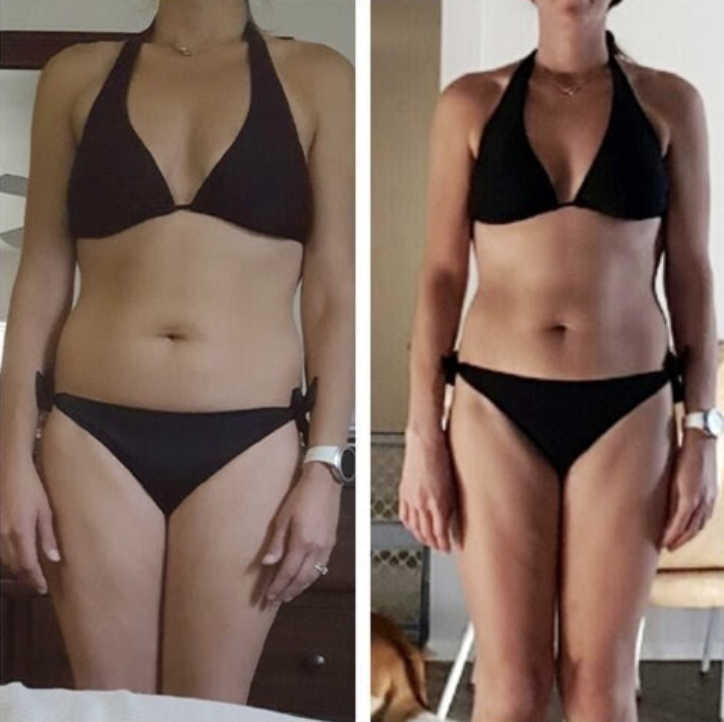Why the Scale Sucks at Measuring Fat Loss (And 5 Ways to Track Progress Instead!)
Weight loss and fat loss are related, but they are NOT the same thing.
Let me be clear: you can step on a scale and see you’re down a few pounds, but the reality is that weight loss you’re seeing may not necessarily be from fat- it can be from lack of water or even less carbs. This is why in a sense, the scale can “lie.” And this is why I always tell my clients to train for a look, not a number.
Chasing an “ideal weight” will often leave you feeling discouraged and unmotivated because weight fluctuations occur so much on a day to day basis.
I encourage my clients to look at the scale as just a tool, but not the only tool to measure progress. If that requires you to put the scale away, I encourage that. If you choose to use the scale as a means of progress, then I encourage you to view it more as a series of data points or a range rather than a reflection of your worth or overall progress.
Let’s take a client example of mine to prove my point.
Melanie was chronically under-eating for years. Her goal was to become stronger and lose body fat.
We started to slowly add more food into her diet over the course of 8 weeks while simultaneously putting her on a 3x a week progressive strength training program. The pictures tell a completely different story from what you would think.
She looks leaner on the right, yes?
Well, she was BUT according to the scale, she actually weighed more. Yep. She went from 133lb on the left to 137lbs on the right.
Melanie became leaner but ended up weighing more. If Melanie solely relied on the scale to measure her progress, she would have been severely disappointed. According to the scale, Melanie actually gained weight BUT looked and felt a hell of a lot better. Her clothes even fit looser despite the scale going up! She was stronger, had more energy throughout her day, noticed an increased sex drive, more regular bowel movements and was even sleeping better- all signs of progress.
When this all became obvious to Melanie, she ended up saying “the hell with the scale!” and actually threw it away. This was a pivotal point in her journey and one I was honored to be a part of.
If you continuously use the scale to measure progress, that’s fine. But keep in mind there are tons of factors that can influence daily & weekly body weight such as:
A higher salt or carb intake than normal
If you’ve had a solid poop
Hydration levels
Food still in your stomach
Food intolerances
Stress
If you have your period
Hormones
Supplements
Soreness from a heavy/intense workout⠀
the reality: Fat loss takes TIME. Sometimes months or even years. It’s important to recognize and be aware of this so you don’t get frustrated and quit. Instead of focusing on the scale to know if you're progressing, focus on other things like:
Progress pictures. These should be taken at least once a month
Body measurements. These should be taken weekly or bi-weekly
How clothes fit. Looser despite what the scale says? Clothes don’t lie!
Your energy levels. Are you experiencing more energy throughout the day? This is a true tale sign of progress!
Strength increases in the gym. If you feel stronger in the gym and are using heavier weights to workout, you are 100% making progress!
It's easier said than done, but try not to let your daily/weekly fluctuations in body weight discourage you. Remember, progress is not linear and the scale does NOT always reflect your fat loss progress.







Add a gym staple to your routine that can help you unlock your fitness goals. The BCAA Supplement supports improved exercise performance and recovery, supports increased muscle protein synthesis, and supports muscle tissue breakdown prevention. This supplement features a refreshing Watermelon taste, making it a tasty addition to any regimen.
Packaged in the USA from globally sourced ingredients at FDA-registered and GMP-certified facilities, it undergoes third-party laboratory testing. This non-GMO supplement is corn-free for total peace of mind.
Ingredients: Vitamin B6 (as Pyridoxine HCl), BCAA 2:1:1 (L-Leucine, L-Isoleucine, L-Valine), L-Glutamine. Other Ingredients: Naturally & Artificially Flavored, Citric Acid, Silicon Dioxide, Malic Acid, Acesulfame Potassium, Sucralose.
Please note: Relevant product and manufacturing certificates can be found in downloadable assets after you start designing
Please note: This product is shipped only to the United States and their territories
Please note: This product is not eligible for publishing on Etsy, Amazon, and TikTok Shop US. More info here.
.: Packaged In The USA from globally sourced ingredients
.: Packaged At FDA Registered and GMP Certified Facilities
.: 3rd Party Laboratory Tested
.: Non-GMO
.: Corn Free
.: Design printed on a sticker label
.: Please note: This product is shipped only to the United States and their territories
.: Please note: This product is not eligible for publishing on Etsy, Amazon, and TikTok Shop US.